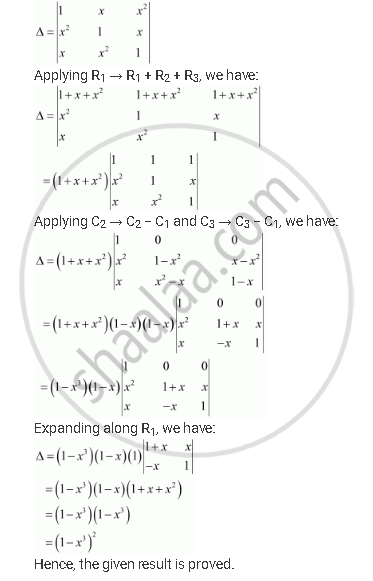Advertisements
Advertisements
Question
By using properties of determinants, show that:
`|(1,x,x^2),(x^2,1,x),(x,x^2,1)| = (1-x^3)^2`
Solution

APPEARS IN
RELATED QUESTIONS
Using properties of determinants prove the following: `|[1,x,x^2],[x^2,1,x],[x,x^2,1]|=(1-x^3)^2`
Using properties of determinants, show that ΔABC is isosceles if:`|[1,1,1],[1+cosA,1+cosB,1+cosC],[cos^2A+cosA,cos^B+cosB,cos^2C+cosC]|=0`
Using properties of determinants, prove that
`|[x+y,x,x],[5x+4y,4x,2x],[10x+8y,8x,3x]|=x^3`
Using the property of determinants and without expanding, prove that:
`|(2,7,65),(3,8,75),(5,9,86)| = 0`
Using the property of determinants and without expanding, prove that:
`|(1, bc, a(b+c)),(1, ca, b(c+a)),(1, ab, c(a+b))| = 0`
Using the property of determinants and without expanding, prove that:
`|(b+c, q+r, y+z),(c+a, r+p, z +x),(a+b, p+q, x + y )| = 2|(a,p,x),(b,q,y),(c, r,z)|`
By using properties of determinants, show that:
`|(-a^2, ab, ac),(ba, -b^2, bc),(ca,cb, -c^2)| = 4a^2b^2c^2`
By using properties of determinants, show that:
`|(1,a,a^2),(1,b,b^2),(1,c,c^2)| = (a - b)(b-c)(c-a)`
By using properties of determinants, show that:
`|(1,1,1),(a,b,c),(a^3, b^3,c^3)|` = (a-b)(b-c)(c-a)(a+b+c)
Without expanding the determinant, prove that
`|(a, a^2,bc),(b,b^2, ca),(c, c^2,ab)| = |(1, a^2, a^3),(1, b^2, b^3),(1, c^2, c^3)|`
Using properties of determinants, prove that:
`|(alpha, alpha^2,beta+gamma),(beta, beta^2, gamma+alpha),(gamma, gamma^2, alpha+beta)|` = (β – γ) (γ – α) (α – β) (α + β + γ)
Using properties of determinants, prove that:
`|(x, x^2, 1+px^3),(y, y^2, 1+py^3),(z, z^2, 1+pz^2)|` = (1 + pxyz) (x – y) (y – z) (z – x), where p is any scalar.
Using properties of determinants, prove that
`|(sin alpha, cos alpha, cos(alpha+ delta)),(sin beta, cos beta, cos (beta + delta)),(sin gamma, cos gamma, cos (gamma+ delta))| = 0`
Using properties of determinants, prove that
`|(a^2 + 2a,2a + 1,1),(2a+1,a+2, 1),(3, 3, 1)| = (a - 1)^3`
Using properties of determinants, prove that \[\begin{vmatrix}a + x & y & z \\ x & a + y & z \\ x & y & a + z\end{vmatrix} = a^2 \left( a + x + y + z \right)\] .
Using properties of determinants, prove that:
`|(a,b,b+c),(c,a,c+a),(b,c,a+b)|` = (a+b+c)(a-c)2
Using properties of determinants, prove the following:
`|(a, b,c),(a-b, b-c, c-a),(b+c, c+a, a+b)| = a^3 + b^3 + c^3 - 3abc`.
Solve for x : `|("a"+"x","a"-"x","a"-"x"),("a"-"x","a"+"x","a"-"x"),("a"-"x","a"-"x","a"+"x")| = 0`, using properties of determinants.
Using properties of determinants, find the value of x for which
`|(4-"x",4+"x",4+"x"),(4+"x",4-"x",4+"x"),(4+"x",4+"x",4-"x")|= 0`
If `|(4 + x, 4 - x, 4 - x),(4 - x,4 + x,4 - x),(4 - x,4 - x, 4 + x)|` = 0, then find the values of x.
Select the correct option from the given alternatives:
The value of a for which system of equation a3x + (a + 1)3 y + (a + 2)3z = 0 ax + (a +1)y + (a + 2)z = 0 and x + y + z = 0 has non zero Soln. is
Answer the following question:
If `|("a", 1, 1),(1, "b", 1),(1, 1, "c")|` = 0 then show that `1/(1 - "a") + 1/(1 - "b") + 1/(1 - "c")` = 1
Evaluate: `|(x + 4, x, x),(x, x + 4, x),(x, x, x + 4)|`
The value of the determinant `|(x , x + y, x + 2y),(x + 2y, x, x + y),(x + y, x + 2y, x)|` is ______.
Let Δ = `|("a", "p", x),("b", "q", y),("c", "r", z)|` = 16, then Δ1 = `|("p" + x, "a" + x, "a" + "p"),("q" + y, "b" + y, "b" + "q"),("r" + z, "c" + z, "c" + "r")|` = 32.
Let P be any non-empty set containing p elements. Then, what is the number of relations on P?
Which of the following is correct?
In a triangle the length of the two larger sides are 10 and 9, respectively. If the angles are in A.P., then the length of the third side can be ______.
If `|(α, 3, 4),(1, 2, 1),(1, 4, 1)|` = 0, then the value of α is ______.
The value of the determinant `|(6, 0, -1),(2, 1, 4),(1, 1, 3)|` is ______.
Without expanding determinant find the value of `|(10,57,107),(12,64,124),(15,78,153)|`
Without expanding determinants find the value of `|(10,57,107), (12, 64, 124), (15, 78, 153)|`
Without expanding determinants find the value of `|(10,57,107),(12,64,124),(15,78,153)|`
Without expanding determinants find the value of `|(10,57,107),(12,64,124),(15,78,153)|`
By using properties of determinant prove that `|(x+y,y+z,z+x),(z,x,y),(1,1,1)|` = 0.
By using properties of determinant prove that `|(x+y,y+z,z+x),(z,x,y),(1,1,1)|=0`
Without expanding evaluate the following determinant.
`|(1, a, b+c),(1, b, c+a),(1, c, a+b)|`
Without expanding determinant find the value of `|(10, 57, 107),(12, 64, 124),(15, 78, 153)|`
